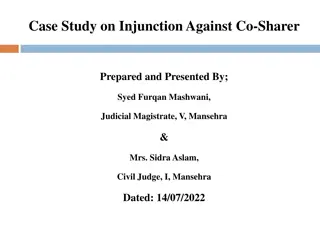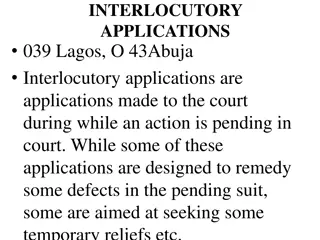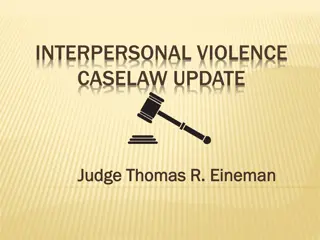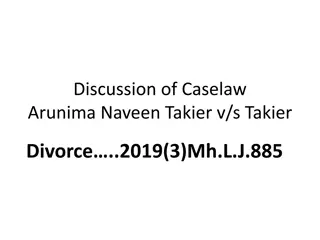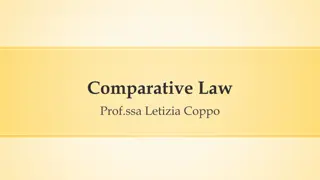Legal Analysis: Injunction Against Co-Sharer in Property Disputes
An injunction is a legal remedy where a party is ordered to refrain from or do a specific act. In property disputes involving co-sharers, the question arises whether injunctive relief can be granted without partition. Two schools of thought exist on this matter, with the first school suggesting that
0 views • 24 slides
Understanding Interlocutory Applications in Court Proceedings
Interlocutory applications are crucial in ongoing court cases, allowing parties to seek remedies, temporary reliefs, or address defects in the suit. These applications can be made in open court or to a judge in chambers through motions. Ex parte applications, made without notifying the opposing part
2 views • 65 slides
Domestic Violence Injunctions: Case Law Update and Legal Considerations
This case law update provides insights into the proper entry of domestic violence injunctions based on acts of violence, recent incidents, due process rights, denial of injunction requests, and stalking as a basis for legal action. It highlights the importance of evidence, patterns of behavior, and
0 views • 52 slides
Analysis of Caselaw Arunima Naveen Takier v/s Takier Divorce Proceedings 2019(3) Mh.L.J.885
The case involves a wife seeking an ex-parte interim order to stay divorce proceedings in the UK and an injunction against her husband. Despite the husband's domicile in the UK, the court maintained jurisdiction. The wife faced challenges defending herself, leading to the granting of an anti-suit in
0 views • 16 slides
Understanding FRAND Holdup and Its Solutions
This research focuses on the complexities of FRAND holdup in the context of standard essential patents (SEPs) and proposes solutions to mitigate this issue. It delves into the reasons behind FRAND holdup, when SEP holders can seek injunction relief, the importance of disclosing comparable royalties,
0 views • 59 slides
Evolution of English Law: From Common Law to Equity and Beyond
The historical origins and development of English law are traced from the XIV century when Equity emerged as a supplement to Common Law, to the XVI and XVII centuries marked by conflicts between the King and Parliament, the establishment of the Star Chamber, and victory of Parliament over the King.
0 views • 22 slides
